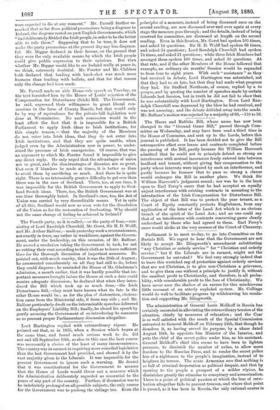Lord Hartington replied with extraordinary vigour. He pointed out that,
as in 1835, when a Session which began at the same time, and found much serious work to do, did not end till September 10th, so also in this case the best course was necessarily a choice of the least of many inconveniences. The country was in earnest in requiring more remedial legislation than the last Government had provided, and showed it by the vast majority given to the Liberals. It was impossible for the present Government to ignore such a warning. He denied that it was constitutional for the Government to assume that the House of Lords would throw out a measure which the Administration deliberately regarded as esssential to the peace of any part of the country. Further, if discussion was to be indefinitely prolonged on all possible subjects, the only course for the Government was to prolong the sittings too. Even the
principles of a measure, instead of being discussed once on the second reading, are now discussedoverund over again at every stage the measure goes through; and the details, instead of being reserved for committee, are discussed at length on the second reading. Even in this Session, Mr. Gorst had spoken 105 times, and asked 18 questions. Sir H. D. Wolff had spoken 68 times, and asked 34 questions ; Lord Randolph Churchill had spoken 74 times, and asked 21 questions ; while three Irish Members had amongst them spoken 160 times, and asked 30 questions. At that rate, and if the other Members of the House followed that example, an ordinary six months' Session would be expanded to from four to eight years. With such " assistance " as they - had received in debate, Lord Hartington was astonished, not that they had to sit late, but that they had made what progress they had. Sir Stafford Northcote, of course, replied by a in quoqne, and by quoting the number of speeches made by certain Liberals last Session, but in truth he did not fail to show that he was substantially with Lord Hartington. Even Lord Ran- dolph Churchill was depressed by the blow he had received, and was not amusing ; and the debate dribbled away into the sands. Mr. Balfour's motion was rejected by a majority of 60,-119 to 59.






























 Previous page
Previous page